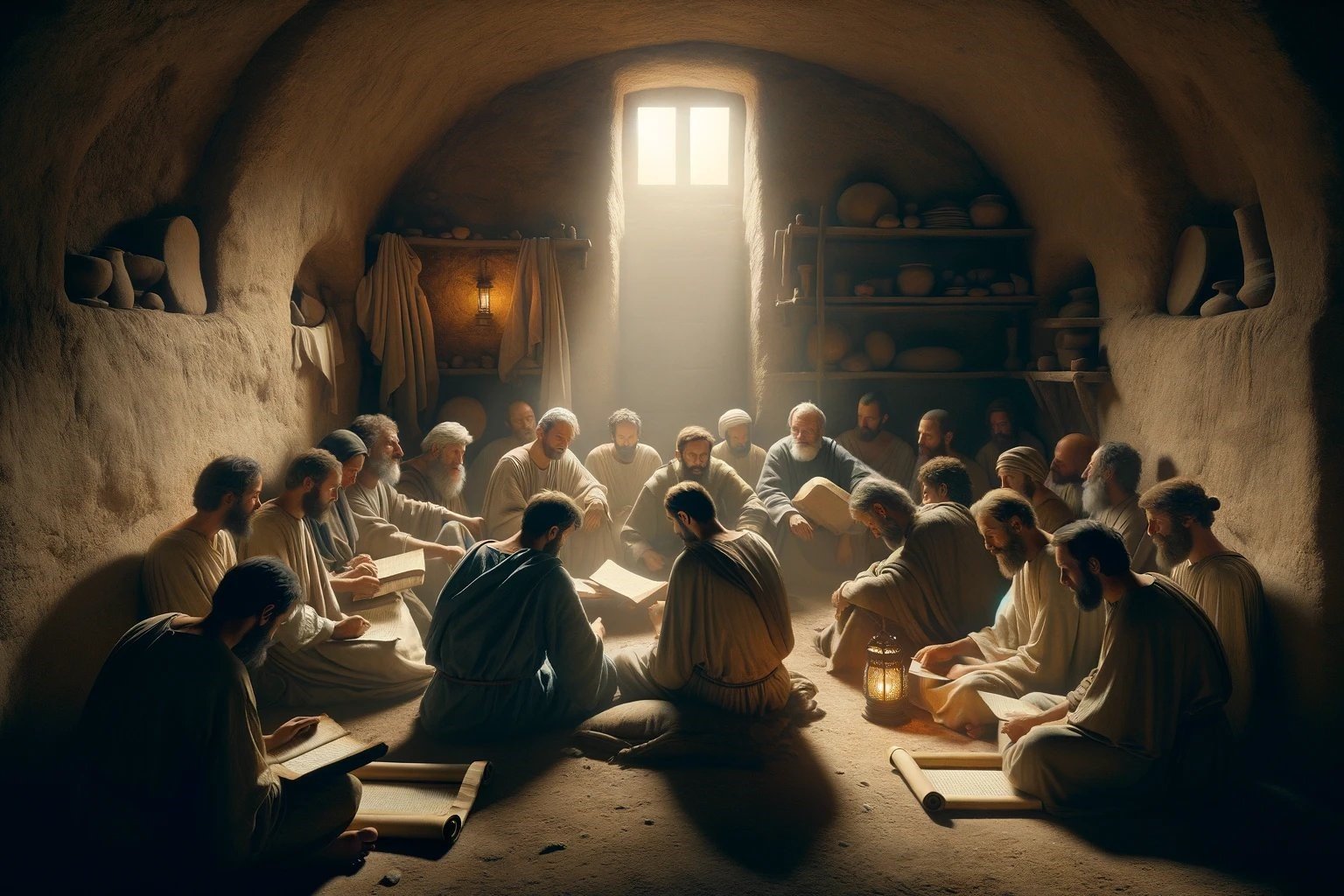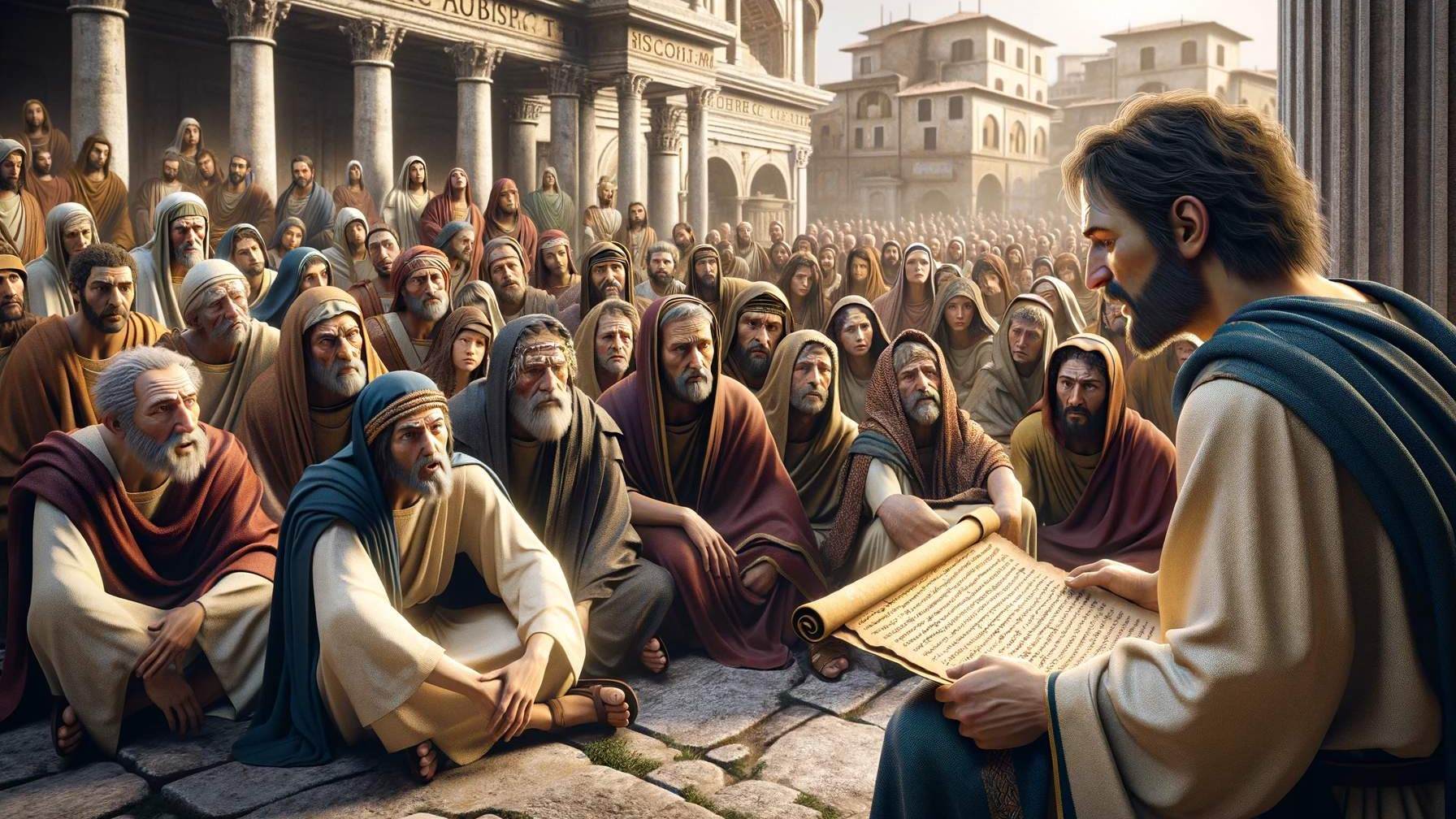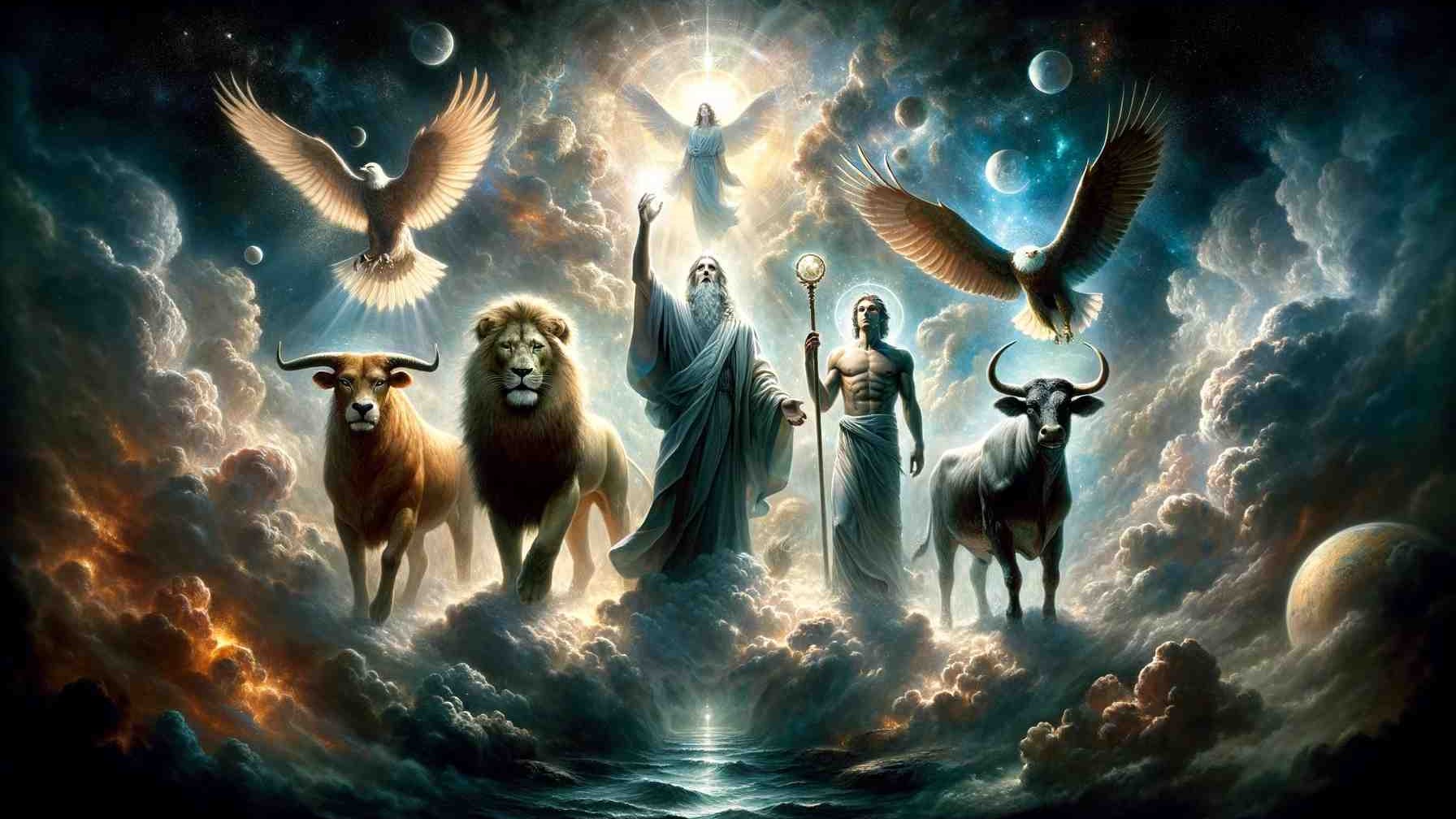Home>Bible Facts>What Type Of Book Is The Book Of Revelation


Bible Facts
What Type Of Book Is The Book Of Revelation
Published: February 11, 2024
Ericka Andersen, an editor at Christian.net, expertly merges digital strategy with content creation, focusing on faith and societal issues. Her communication skills enhance the platform's engaging narratives, fostering meaningful dialogue on belief's impact on society.
Discover fascinating Bible facts about the Book of Revelation and its unique literary genre. Uncover the type of book it is and its significance in biblical literature.
(Many of the links in this article redirect to a specific reviewed product. Your purchase of these products through affiliate links helps to generate commission for Christian.net, at no extra cost. Learn more)
Table of Contents
Introduction
The Book of Revelation, also known as the Apocalypse of John, is a captivating and enigmatic piece of literature found in the New Testament of the Bible. This final book of the Christian scriptures has long fascinated scholars, theologians, and believers alike, sparking intense debates and diverse interpretations. Its profound symbolism, vivid imagery, and prophetic nature have contributed to its enduring appeal and relevance throughout history.
Revelation is a book of mystery and intrigue, offering a glimpse into the cosmic battle between good and evil, the ultimate triumph of righteousness, and the promise of a new heaven and earth. Its apocalyptic themes and visions of divine judgment and redemption have captured the imagination of readers for centuries, inspiring awe, curiosity, and contemplation.
As we delve into the exploration of the Book of Revelation, we will unravel its genre, literary style, and the various interpretations that have emerged over time. This journey will shed light on the profound significance of this ancient text and its enduring impact on Christian theology and eschatology.
Join me as we embark on a fascinating expedition into the depths of Revelation, where we will encounter mystical symbolism, dramatic narratives, and profound spiritual truths that continue to resonate with believers and scholars across the globe. Let us unravel the mysteries and unveil the timeless wisdom encapsulated within the pages of this extraordinary biblical book.
Read more: What Is Babylon In The Book Of Revelation
The Genre of the Book of Revelation
The Book of Revelation belongs to a unique literary genre known as apocalyptic literature. This genre is characterized by its symbolic imagery, vivid visions, and a focus on the cosmic struggle between good and evil. Apocalyptic writings often convey messages of hope, perseverance, and divine intervention in the face of adversity. Revelation, in particular, embodies the quintessential features of apocalyptic literature, setting it apart from other biblical books.
One defining aspect of apocalyptic literature is its use of symbolic language and imagery to convey profound spiritual truths. The Book of Revelation is replete with vivid and often surreal imagery, including fantastical creatures, celestial phenomena, and dramatic visions of cosmic events. These symbols serve as a means of communicating complex theological concepts and spiritual realities, inviting readers to engage with the text on a deeper, metaphorical level.
Furthermore, apocalyptic literature frequently incorporates themes of eschatology, or the study of the end times and the ultimate destiny of humanity. Revelation offers a panoramic view of the future, depicting the final judgment, the defeat of evil, and the establishment of God's eternal kingdom. This emphasis on the culmination of history and the ultimate triumph of righteousness distinguishes apocalyptic writings, including Revelation, from other biblical genres.
Moreover, apocalyptic literature often addresses the theme of suffering and persecution faced by the faithful. The Book of Revelation, written during a time of intense persecution of early Christians, provides a message of encouragement and endurance in the face of adversity. Its apocalyptic imagery serves to instill hope and resilience in the hearts of believers, assuring them of God's ultimate victory over evil and the eventual restoration of all things.
In essence, the genre of the Book of Revelation as apocalyptic literature sets it apart as a profound and enigmatic work that transcends conventional narrative forms. Its symbolic richness, eschatological focus, and message of hope amidst tribulation position it as a timeless and influential testament to the enduring power of faith and the triumph of divine justice.
This section provides a glimpse into the unique genre of the Book of Revelation, offering a foundation for understanding its distinctive literary and theological characteristics. As we continue our exploration, we will delve deeper into the literary style of Revelation, unraveling the intricacies of its symbolic language and prophetic visions.
The Literary Style of the Book of Revelation
The Book of Revelation is renowned for its distinctive literary style, characterized by a rich tapestry of symbolic imagery, vivid metaphors, and dramatic narrative elements. This unique style sets it apart as a work of unparalleled creativity and visionary expression within the biblical canon. At the heart of Revelation's literary composition lies the visionary experiences of the author, traditionally attributed to the apostle John, who received profound revelations through divine encounters.
One of the defining features of Revelation's literary style is its use of symbolism and allegory to convey profound spiritual truths. The book is replete with intricate and evocative symbols, such as the seven seals, seven trumpets, and seven bowls, each representing significant aspects of divine judgment and redemption. These symbols serve as a means of transcending literal interpretation, inviting readers to engage with the text on a deeper, metaphorical level, and unravel the layers of meaning embedded within its cryptic imagery.
Furthermore, Revelation employs a highly structured and repetitive literary pattern, employing numerical symbolism and recurring motifs to underscore its thematic significance. The use of numbers, such as seven, twelve, and multiples thereof, imbues the text with a sense of divine order and completeness, reinforcing the overarching message of God's sovereignty and ultimate triumph over evil. This intricate numerical symbolism adds depth and complexity to the narrative, inviting readers to discern the underlying patterns and significance woven into the fabric of the text.
In addition to its symbolic richness, the literary style of Revelation encompasses vivid and dramatic imagery, depicting cosmic battles, celestial phenomena, and apocalyptic visions with unparalleled intensity. The book unfolds as a series of awe-inspiring tableaus, portraying the cosmic conflict between the forces of good and evil in a manner that transcends the boundaries of conventional storytelling. The use of vivid imagery serves to evoke emotional and spiritual responses, immersing readers in the profound drama of divine judgment and redemption unfolding on a cosmic scale.
Moreover, Revelation's literary style incorporates elements of prophecy and visionary revelation, as the author communicates divine messages through a series of revelatory encounters and supernatural visions. These visionary experiences imbue the text with a sense of immediacy and urgency, as the author conveys the timeless truths of God's sovereignty and the ultimate fulfillment of His redemptive purposes.
In essence, the literary style of the Book of Revelation is a testament to the unparalleled creativity and visionary expression of its author, offering a captivating blend of symbolic richness, structured symbolism, vivid imagery, and prophetic revelation. This distinctive style transcends the boundaries of conventional storytelling, inviting readers into a realm of profound spiritual insight and cosmic drama. As we continue our exploration of Revelation, we will delve deeper into the interpretive challenges and diverse perspectives that have emerged in response to its enigmatic literary style.
The Interpretation of the Book of Revelation
The interpretation of the Book of Revelation has been a subject of intense scholarly debate and diverse theological perspectives throughout history. Its enigmatic symbolism, apocalyptic imagery, and prophetic visions have given rise to a myriad of interpretive frameworks, each seeking to unravel the mysteries and discern the underlying message of this profound biblical text.
One of the primary challenges in interpreting Revelation lies in its symbolic and metaphorical language, which defies simplistic, literal understanding. Various schools of interpretation have emerged, each offering distinct approaches to unlocking the meaning embedded within its cryptic imagery. These include the preterist, historicist, futurist, and idealist perspectives, each emphasizing different temporal and spiritual dimensions of the book's message.
The preterist interpretation views Revelation as primarily addressing events contemporary to the author's time, particularly the persecution faced by early Christians and the fall of the Roman Empire. This perspective seeks to situate the book within its historical context, emphasizing its relevance to the first-century audience while acknowledging its broader spiritual significance.
In contrast, the historicist interpretation sees Revelation as a prophetic panorama of church history, spanning from the apostolic age to the culmination of human history. This approach seeks to identify specific historical events and figures within the book's symbolism, mapping them onto a timeline of religious and political developments over the centuries.
The futurist interpretation regards much of Revelation as pertaining to future, end-time events, including the rise of a global ruler, cataclysmic judgments, and the return of Christ. This perspective emphasizes the book's relevance to the eschatological climax of human history, anticipating its fulfillment in a period yet to come.
The idealist interpretation, also known as the symbolic or spiritual approach, emphasizes the timeless and universal themes embedded within Revelation's imagery, viewing it as a symbolic portrayal of the ongoing spiritual conflict between good and evil. This perspective highlights the book's relevance to the spiritual journey of individuals and the broader cosmic struggle between divine and malevolent forces.
Furthermore, the interpretive landscape of Revelation encompasses a spectrum of nuanced perspectives, blending elements of these primary frameworks and offering unique insights into its multifaceted message. The diversity of interpretive approaches reflects the enduring fascination and profound complexity of this enigmatic biblical book.
As we navigate the interpretive terrain of Revelation, we encounter a rich tapestry of theological reflection, historical analysis, and spiritual discernment, each contributing to a deeper understanding of its timeless significance. The interpretive challenges posed by Revelation invite readers to engage with its profound symbolism and prophetic visions, seeking to discern the enduring truths and spiritual insights encapsulated within its enigmatic narrative.
In essence, the interpretation of the Book of Revelation encompasses a rich tapestry of perspectives, each offering unique insights into its profound symbolism and enduring message. As we continue to grapple with its enigmatic mysteries, we are drawn into a deeper exploration of the timeless truths and spiritual revelations that continue to resonate with believers and scholars alike.
Conclusion
In conclusion, the Book of Revelation stands as a testament to the enduring power of apocalyptic literature, captivating readers with its enigmatic symbolism, vivid imagery, and profound theological insights. As a distinctive work within the New Testament, Revelation transcends conventional genres, offering a visionary portrayal of cosmic conflict, divine judgment, and the ultimate triumph of righteousness. Its unique literary style, characterized by symbolic richness, structured symbolism, and prophetic revelation, sets it apart as a work of unparalleled creativity and visionary expression.
The interpretive challenges posed by Revelation have given rise to a diverse array of scholarly perspectives, each seeking to unravel its mysteries and discern the underlying message embedded within its cryptic imagery. From preterist and historicist views that emphasize historical context to futurist and idealist interpretations that highlight eschatological and spiritual dimensions, the book continues to inspire profound theological reflection and spiritual discernment.
Moreover, the enduring relevance of Revelation lies in its timeless themes of hope, perseverance, and divine sovereignty in the face of adversity. Its apocalyptic visions serve as a source of encouragement and assurance for believers, reminding them of the ultimate fulfillment of God's redemptive purposes and the promise of a new heaven and earth.
As we journey through the depths of Revelation, we are invited to engage with its profound symbolism, visionary imagery, and enduring message of hope amidst tribulation. The book's enigmatic nature continues to captivate the hearts and minds of readers, inspiring awe, curiosity, and contemplation across diverse cultural and religious landscapes.
In essence, the Book of Revelation stands as a timeless testament to the enduring power of faith, the triumph of divine justice, and the promise of a future redeemed. Its profound significance within Christian theology and eschatology continues to resonate with believers and scholars, inviting us to embark on a fascinating expedition into the depths of its enigmatic narrative. As we conclude our exploration, we are reminded of the enduring impact and timeless relevance of this extraordinary biblical book, which continues to inspire and illuminate the hearts of those who seek to unravel its mysteries.















